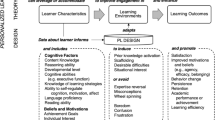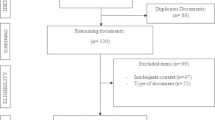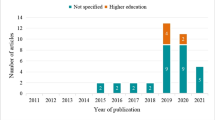Abstract
With the improvement of Information and Communication Technologies (ICTs, online learning has become a viable means for teaching and learning. Nonetheless, online learning is still facing various challenges. The challenges include lack of support and loneliness experienced by learners. Adaptive online learning is one of the means that researchers are proposing to support learners and reduce the loneliness they experience in online learning. Research in adaptive online learning has been on the rise. Though there are several review studies that have attempted to provide summaries of research and development happening in this area, there is still lack of a comprehensive and up-to-date review that looks at the aspects of adaptive online learning systems in terms of the learner characteristics being modelled, domain model, adaptation model, the various techniques used to achieve the various tasks in those models and the impact the adaptive online learning has on learning. This study therefore was initiated in order to fill this gap. The study was carried out using a systematic literature review methodology. A total of 59 articles were used in the study, drawn from six databases namely Science direct, IEEE explore, ACM, Emerald, Springer and Taylor and Francis. The results indicate that: the most used learner characteristic is learning style even though the use of learning knowledge is on the rise; there is a rise in the use of machine learning algorithms in learner modelling; learning content is the most common target for adaptation; rules is the most utilized method in the adaptation model; and most adaptive online learning have not been evaluated in terms of learning. There is therefore a need for evaluation of the developed adaptive online learning and more studies that utilize more than one learner characteristic as the basis for adaptation and those that use machine learning.



Similar content being viewed by others
Abbreviations
- CNN:
-
Convolutional Neural Networks
- RL:
-
Reinforcement Learning
- HMM:
-
Hidden Markov Model
- ACM:
-
Association for Computing Machinery
- IEEE:
-
Institute of Electrical and Electronics Engineers
References
Aboagye, E., Yawson, J. A., & Appiah, K. N. (2020). COVID-19 and E-learning: The challenges of students in tertiary institutions. Social Education Research, 2(1), 109–115.
Abyaa, A., Idrissi, M. K., & Bennani, S. (2017). An adult learner’s knowledge model based on ontologies and rule reasoning. ACM International Conference Proceeding Series. https://doi.org/10.1145/3175628.3175656
Abyaa, A., KhalidiIdrissi, M., & Bennani, S. (2019). Learner modelling: systematic Review of the literature from the last 5 years. Educational Technology Research and Development. https://doi.org/10.1007/s11423-018-09644-1
AfiniNormadhi, N. B., Shuib, L., Md Nasir, H. N., Bimba, A., Idris, N., & Balakrishnan, V. (2019). Identification of personal traits in adaptive learning environment: Systematic literature review. Computers and Education, 130, 168–190. https://doi.org/10.1016/j.compedu.2018.11.005
Ahmadaliev, D., **aohui, C., Abduvohidov, M., Medatov, A., & Temirova, G. (2019). An adaptive activity sequencing instrument to enhance e-learning: An integrated application of overlay user model and mathematical programming on the Web. 2019 International Conference on Computer and Information Sciences, ICCIS 2019, 1–4. https://doi.org/10.1109/ICCISci.2019.8716473
Aissaoui, O. E., El Madani, Y. E. A., Oughdir, L., & Allioui, Y. E. (2019). Combining supervised and unsupervised machine learning algorithms to predict the learners’ learning styles. Procedia Computer Science, 148, 87–96. https://doi.org/10.1016/j.procs.2019.01.012
Al-Omari, M., Carter, J., & Chiclana, F. (2016). A hybrid approach for supporting adaptivity in e-learning environments. International Journal of Information and Learning Technology, 33(5), 333–348. https://doi.org/10.1108/IJILT-04-2016-0014
Al-Rajhi, L., Salama, R., & Gamalel-Din, S. (2014). Personalized intelligent assessment model for measuring initial students abilities. ACM International Conference Proceeding Series. https://doi.org/10.1145/2643604.2643606
Al-tarabily, M. M., Abdel-kader, R. F., Azeem, G. A., & Marie, M. I. (2018). Optimizing dynamic multi - agent performance in E - learning environment. IEEE Access. https://doi.org/10.1109/ACCESS.2018.2847334
Al Duhayyim, M., & Newbury, P. (2018). Concept-based and fuzzy adaptive e-learning. ACM International Conference Proceeding Series. https://doi.org/10.1145/3234825.3234832
Allinjawi, A., Alsulami, A., Alsaedy, Y., & Hussein, K. (2018). Proposing an adaptive e-learning system using learners’ knowledge in simulating medical module. In Proceedings - 17th IEEE/ACIS International Conference on Computer and Information Science, ICIS 2018, 45–50. https://doi.org/10.1109/ICIS.2018.8466514.
Alshammari, M., Anane, R., & Hendley, R. J. (2015). The impact of learning style adaptivity in teaching computer security. In Annual Conference on Innovation and Technology in Computer Science Education, ITiCSE, 2015-June, 135–140. https://doi.org/10.1145/2729094.2742614.
Alsobhi, A. Y., & Alyoubi, K. H. (2019). Adaptation algorithms for selecting personalised learning experience based on learning style and dyslexia type. Data Technologies and Applications, 53(2), 189–200. https://doi.org/10.1108/DTA-10-2018-0092
Anantharaman, H., Mubarak, A., & Shobana, B. T. (2019). Modelling an Adaptive e-Learning System Using LSTM and Random Forest Classification. In 2018 IEEE Conference on E-Learning, e-Management and e-Services, IC3e 2018, 29–34. https://doi.org/10.1109/IC3e.2018.8632646.
Antony, J., Thottupuram, R., Thomas, S., & John, M. V. (2012). Semantic web based adaptive E-learning triggered through short message services. In ICCSE 2012 - Proceedings of 2012 7th International Conference on Computer Science and Education, Iccse, 1860–1863. https://doi.org/10.1109/ICCSE.2012.6295434.
Atchariyachanvanich, K., Nalintippayawong, S., & Julavanich, T. (2019). Reverse SQL question generation algorithm in the dblearn adaptive e-learning system. IEEE Access, 7, 54993–55004. https://doi.org/10.1109/ACCESS.2019.2912522
Awais, M., Habiba, U., Khalid, H., Shoaib, M., & Arshad, S. (2019). An adaptive feedback system to improve student performance based on collaborative behavior. IEEE Access, 7, 107171–107178. https://doi.org/10.1109/ACCESS.2019.2931565
Azzi, I., Jeghal, A., Radouane, A., Yahyaouy, A., & Tairi, H. (2020). A robust classification to predict learning styles in adaptive E-learning systems. Education and Information Technologies, 25(1), 437–448. https://doi.org/10.1007/s10639-019-09956-6
Bauer, M., Bräuer, C., Schuldt, J., Niemann, M., & Krömker, H. (2019). Application of wearable technology for the acquisition of learning motivation in an adaptive e-learning platform. Advances in Intelligent Systems and Computing, 795, 29–40. https://doi.org/10.1007/978-3-319-94619-1_4
Beldagli, B., & Adiguzel, T. (2010). Illustrating an ideal adaptive e-learning: A conceptual framework. Procedia - Social and Behavioral Sciences, 2(2), 5755–5761. https://doi.org/10.1016/j.sbspro.2010.03.939
Birjali, A. M., Beni-hssane, A., & Erritali, M. (2018). A novel adaptive e-learning model based on Big Data by using competence-based knowledge and social learner activities. Applied Soft Computing Journal. https://doi.org/10.1016/j.asoc.2018.04.030
Boussakssou, M., Hssina, B., & Erittali, M. (2020). Towards an adaptive E-learning system based on Q-learning algorithm. Procedia Computer Science, 170, 1198–1203. https://doi.org/10.1016/j.procs.2020.03.028
Bradac, V., & Walek, B. (2017). A comprehensive adaptive system for e-learning of foreign languages. Expert Systems with Applications, 90, 414–426. https://doi.org/10.1016/j.eswa.2017.08.019
Brusilovsky, P. (2007). Adaptive Navigation Support 8 . 2 Adaptive Navigation Support : From Adaptive Hypermedia. 263–290.
Brusilovsky, P., & Millán, E. (2007). User models for adaptive hypermedia and adaptive educational systems. Springer.
Chrysafiadi, K., & Virvou, M. (2015). Fuzzy logic for adaptive instruction in an e-learning environment for computer programming. IEEE Transactions on Fuzzy Systems, 23(1), 164–177. https://doi.org/10.1109/TFUZZ.2014.2310242
Ciloglugil, B., & Inceoglu, M. M. (2018). A learner ontology based on learning style models for adaptive E-learning. In Lecture Notes in Computer Science (including subseries Lecture Notes in Artificial Intelligence and Lecture Notes in Bioinformatics): Vol. 10961 LNCS. Springer International Publishing. https://doi.org/10.1007/978-3-319-95165-2_14.
Colchester, K., Hagras, H., & Alghazzawi, D. (2017). A survey of artificial intelligence techniques employed for adaptive educational systems within E-learning platforms. Journal of Artificial Intelligence and Soft Computing Research, 7(1), 47–64. https://doi.org/10.1515/jaiscr-2017-0004
Deeb, B., Hassan, Z., & Beseiso, M. (2014). An adaptive HMM based approach for improving e-Learning methods. In 2014 World Congress on Computer Applications and Information Systems, WCCAIS 2014. https://doi.org/10.1109/WCCAIS.2014.6916638.
Dolenc, K., & Aberšek, B. (2015). TECH8 intelligent and adaptive e-learning system: Integration into Technology and Science classrooms in lower secondary schools. Computers and Education, 82, 354–365. https://doi.org/10.1016/j.compedu.2014.12.010
Drissi, S., & Amirat, A. (2016). An adaptive e-learning system based on student’s learning styles: An empirical study. International Journal of Distance Education Technologies, 14(3), 34–51. https://doi.org/10.4018/IJDET.2016070103
El-Sabagh, H. A. (2021). Adaptive e-learning environment based on learning styles and its impact on development students’ engagement. International Journal of Educational Technology in Higher Education. https://doi.org/10.1186/s41239-021-00289-4
El Fazazi, H., Elgarej, M., Qbadou, M., & Mansouri, K. (2021). Design of an adaptive e-learning system based on multi-agent approach and reinforcement learning. Engineering, Technology & Applied Science Research, 11(1), 6637–6644.
El Guabassi, I., Bousalem, Z., Al Achhab, M., Jellouli, I., & El Mohajir, B. E. (2018). Personalized adaptive content system for context-Aware ubiquitous learning. Procedia Computer Science, 127, 444–453. https://doi.org/10.1016/j.procs.2018.01.142
Ennouamani, S., & Mahani, Z. (2017). An overview of adaptive e-learning systems. In 2017 Eighth International Conference on Intelligent Computing and Information Systems (ICICIS), Icicis, 342–347. https://doi.org/10.1109/INTELCIS.2017.8260060.
Fatahi, S. (2019). An experimental study on an adaptive e-learning environment based on learner’s personality and emotion. Education and Information Technologies, 24(4), 2225–2241. https://doi.org/10.1007/s10639-019-09868-5
Fazazi, Hanaa El, Samadi, A., Qbadou, M., Mansouri, K., & Elgarej, M. (2019). A learning style indetification approach in adaptive e-learning system Springer.
GopalaKrishnan, T., & Sengottuvelan, P. (2016). A hybrid PSO with Naïve Bayes classifier for disengagement detection in online learning. Program, 50(2), 215–224. https://doi.org/10.1108/PROG-07-2015-0047
Hassan, M. A., Habiba, U., Majeed, F., & Shoaib, M. (2021). Adaptive gamification in e-learning based on students’ learning styles. Interactive Learning Environments, 29(4), 545–565. https://doi.org/10.1080/10494820.2019.1588745
Hnatchuk, Y., Hnatchuk, A., Pityn, M., Hlukhov, I., & Cherednichenko, O. (2021). Intelligent decision support agent based on fuzzy logic in athletes’ adaptive e-learning systems. CEUR Workshop Proceedings, 2853, 258–265.
Hssina, B., & Erritali, M. (2019). A personalized pedagogical objectives based on a genetic algorithm in an adaptive learning system. Procedia Computer Science, 151(2018), 1152–1157. https://doi.org/10.1016/j.procs.2019.04.164
Hu, P. C., & Kuo, P. C. (2017). Adaptive learning system for E-learning based on EEG brain signals. In 2017 IEEE 6th Global Conference on Consumer Electronics, GCCE 2017, 2017-Janua(Gcce), 1–2. https://doi.org/10.1109/GCCE.2017.8229382.
Ifenthaler, D., & Yau, J. Y. K. (2020). Utilising learning analytics to support study success in higher education: A systematic review. Educational Technology Research and Development, 68(4), 1961–1990. https://doi.org/10.1007/s11423-020-09788-z
Kabudi, T., Pappas, I., & Olsen, D. H. (2021). AI-enabled adaptive learning systems: A systematic map** of the literature. Computers and Education: Artificial Intelligence, 2, 100017. https://doi.org/10.1016/j.caeai.2021.100017
Kibuku, R. N., Ochieng, D. O., & Wausi, A. N. (2020). E-learning challenges faced by universities in Kenya: A literature review. Electronic Journal of E-Learning, 18(2), 150–161.
Knutov, E., De Bra, P., & Pechenizkiy, M. (2009). AH 12 years later: A comprehensive survey of adaptive hypermedia methods and techniques. New Review of Hypermedia and Multimedia. https://doi.org/10.1080/13614560902801608
Kolekar, S. V., Pai, R. M., & ManoharaPai, M. M. (2018). Adaptive user interface for moodle based e-learning system using learning styles. Procedia Computer Science, 135, 606–615. https://doi.org/10.1016/j.procs.2018.08.226
Kostadinova, H., Totkov, G., & Indzhov, H. (2012). Adaptive e-learning system based on accumulative digital activities in Revised Bloom’s Taxonomy. ACM International Conference Proceeding Series. https://doi.org/10.1145/2383276.2383330
Kularbphettong, K., Kedsiribut, P., & Roonrakwit, P. (2015). Develo** an adaptive web-based intelligent tutoring system using mastery learning technique. Procedia - Social and Behavioral Sciences, 191, 686–691. https://doi.org/10.1016/j.sbspro.2015.04.619
Lagman, A. C., & Mansul, D. M. (2017). Extracting personalized learning path in adaptive elearning environment using rule based assessment. ACM International Conference Proceeding Series. https://doi.org/10.1145/3176653.3176679
Lancheros-Cuesta, D., Carrillo-Ramos, A., & Pavlich-Mariscal, J. A. (2015). Kamachiy’Mayistru: Adaptive module to support teaching to people with learning difficulties. International Journal of Web Information Systems, 11(4), 510–526. https://doi.org/10.1108/IJWIS-04-2015-0010
Lancheros-Cuesta, D. J., Carrillo-Ramos, A., & Pavlich-Mariscal, J. A. (2014). Content adaptation for students with learning difficulties: Design and case study. International Journal of Web Information Systems, 10(2), 106–130. https://doi.org/10.1108/IJWIS-12-2013-0040
Landsberg, C. R., Astwood, R. S., Van Buskirk, W. L., Townsend, L. N., Steinhauser, N. B., & Mercado, A. D. (2012). Review of adaptive training system techniques. Military Psychology, 24(2), 96–113. https://doi.org/10.1080/08995605.2012.672903
Liu, M., Kang, J., Zou, W., Lee, H., Pan, Z., & Corliss, S. (2017). Using data to understand how to better design adaptive learning. Technology, Knowledge and Learning, 22(3), 271–298. https://doi.org/10.1007/s10758-017-9326-z
Martin, F., Chen, Y., Moore, R. L., & Westine, C. D. (2020). Systematic review of adaptive learning research designs, context, strategies, and technologies from 2009 to 2018. Educational Technology Research and Development, 68(4), 1903–1929. https://doi.org/10.1007/s11423-020-09793-2
Mavroudi, A., Hadzilacos, T., & Angeli, C. (2016). An adaptive e-learning strategy to overcome the inherent difficulties of the learning content. In Lecture Notes in Computer Science (Including Subseries Lecture Notes in Artificial Intelligence and Lecture Notes in Bioinformatics), 9891 LNCS, 440–445. https://doi.org/10.1007/978-3-319-45153-4_40.
Megahed, M., & Mohammed, A. (2020). Modeling adaptive E-Learning environment using facial expressions and fuzzy logic. Expert Systems with Applications, 157, 113460. https://doi.org/10.1016/j.eswa.2020.113460
Micah, E., Colecraft, E., Lartey, A., Aryeetey, R., & Marquis, G. (2018). A model of adaptive e-learning in an ODL environment. Mehran University Research Journal of Food, Agriculture, Nutrition and Development, 12(1), 5789–5801.
Montazer, G. A., & Rezaei, M. S. (2013). E-learners grou** in uncertain environment using fuzzy ART-Snap-Drift neural network. In 4th International Conference on E-Learning and e-Teaching, ICELET 2013, 112–116. https://doi.org/10.1109/ICELET.2013.6681656.
Nurjanah, D. (2018). LifeOn, a ubiquitous lifelong learner model ontology supporting adaptive learning. IEEE Global Engineering Education Conference, EDUCON, 2018-April (pp. 866–871). https://doi.org/10.1109/EDUCON.2018.8363321
Okoli, C. (2015). A guide to conducting a standalone systematic literature review. Communications of the Association for Information Systems, 37(1), 879–910.
Rani, M., Vyas, R., & Vyas, O. P. (2017). OPAESFH: Ontology-based personalized adaptive e-learning system using FPN and HMM. In IEEE Region 10 Annual International Conference, Proceedings/TENCON, 2017-Decem, 2441–2446. https://doi.org/10.1109/TENCON.2017.8228271.
Samia, D., & Abdelkrim, A. (2012). An adaptive educationnal hypermedia system integrating learning styles: Model and experiment. 2012 International Conference on Education and E-Learning Innovations, ICEELI 2012. https://doi.org/10.1109/ICEELI.2012.6360641.
Sethi, M. A., Lomte, S. S., & Shinde, U. B. (2016). Adaptive eLearning system for visual and verbal learners (pp. 2029–2033).
Sidi-Ali, M. A. (2019). Adaptive E-learning: Motivating learners whilst adapting feedback to cultural background. ACM UMAP 2019 - Proceedings of the 27th ACM Conference on User Modeling, Adaptation and Personalization, pp 341–344. https://doi.org/10.1145/3320435.3323464.
Suryani, M., Santaso, H., & Hasibuan, S. (2014). Learning Content Personalization Based on Triple-Factor Learning Type Approach in e-learning. pp 494–501.
Tashtoush, Y. M., Al-Soud, M., Fraihat, M., Al-Sarayrah, W., & Alsmirat, M. A. (2017). Adaptive e-learning web-based English tutor using data mining techniques and Jackson’s learning styles. In 2017 8th International Conference on Information and Communication Systems, ICICS 2017, pp 86–91. https://doi.org/10.1109/IACS.2017.7921951.
Trikha, N., & Godbole, A. (2016). Adaptive e-learning system using hybrid approach. In Proceedings of the International Conference on Inventive Computation Technologies, ICICT 2016, 2. https://doi.org/10.1109/INVENTIVE.2016.7824844.
Troussas, C., Chrysafiadi, K., & Virvou, M. (2019). An intelligent adaptive fuzzy-based inference system for computer-assisted language learning. Expert Systems with Applications, 127, 85–96. https://doi.org/10.1016/j.eswa.2019.03.003
Truong, H. M. (2016). Integrating learning styles and adaptive e-learning system: Current developments, problems and opportunities. Computers in Human Behavior, 55, 1185–1193. https://doi.org/10.1016/j.chb.2015.02.014
Ueda, H., Furukawa, M., Yamaji, K., & Nakamura, M. (2018). SCORMAdaptiveQuiz: Implementation of adaptive e-learning for moodle. Procedia Computer Science, 126, 2261–2270. https://doi.org/10.1016/j.procS.2018.07.223
Vandewaetere, M., Desmet, P., & Clarebout, G. (2011). The contribution of learner characteristics in the development of computer-based adaptive learning environments. Computers in Human Behavior, 27(1), 118–130. https://doi.org/10.1016/j.chb.2010.07.038
Wan, S., & Niu, Z. (2020). A hybrid e-learning recommendation approach based on learners’ influence propagation. IEEE Transactions on Knowledge and Data Engineering, 32(5), 827–840. https://doi.org/10.1109/TKDE.2019.2895033
Wu, C. H., Chen, T. C., Yan, Y. H., & Lee, C. F. (2017). Develo** an adaptive e-learning system for learning excel. In Proceedings of the 2017 IEEE International Conference on Applied System Innovation: Applied System Innovation for Modern Technology, ICASI 2017, 1973–1975. https://doi.org/10.1109/ICASI.2017.7988583.
Wu, C. H., Chen, Y. S., & Chen, T. C. (2018). An Adaptive e-learning system for enhancing learning performance: Based on dynamic scaffolding theory. Eurasia Journal of Mathematics, Science and Technology Education, 14(3), 903–913.
**e, H., Chu, H. C., Hwang, G. J., & Wang, C. C. (2019). Trends and development in technology-enhanced adaptive/personalized learning: A systematic review of journal publications from 2007 to 2017. Computers and Education, 140(June), 103599. https://doi.org/10.1016/j.compedu.2019.103599
Yasir, M., & Sharif, S. (2011). An approach to adaptive e-learning hypermedia system based on learning styles ( AEHS-LS ): Implementation and evaluation. International Journal of Library and Information Science, 3(January), 15–28.
Yel, M. B. (2018). An adaptive e-learning model based on Myers- Briggs type indicator ( MBTI ). Third International Conference on Informatics and Computing (ICIC), 2018, 1–4.
Acknowledgements
The authors wish to acknowledge the support given by the University of Nairobi’s School of Computing and Informatics faculty.
Funding
This research was funded by the Kenya National Research Fund 2016/2017 grant award, awarded to Kenyatta University, University of Nairobi, and The Cooperative University of Kenya in the multidisciplinary-multiinstitutional category.
Author information
Authors and Affiliations
Contributions
All the authors listed reviewed the manuscript at least once.
Corresponding author
Ethics declarations
Conflict of interests
The authors declare that there are no competing interests.
Ethical Approval
No ethical approval was required for this study.
Additional information
Publisher's Note
Springer Nature remains neutral with regard to jurisdictional claims in published maps and institutional affiliations.
Rights and permissions
About this article
Cite this article
Ochukut, S.A., Oboko, R.O., Miriti, E. et al. Research Trends in Adaptive Online Learning: Systematic Literature Review (2011–2020). Tech Know Learn 28, 431–448 (2023). https://doi.org/10.1007/s10758-022-09615-9
Accepted:
Published:
Issue Date:
DOI: https://doi.org/10.1007/s10758-022-09615-9




